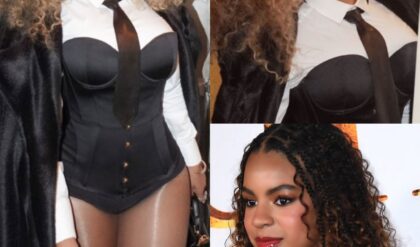“The green stands for every person who feels othered,” said Cynthia Erivo, explaining her intentional depiction of Elphaba as a Black woman.
For the last few weeks, “Wicked” has certainly had a “Barbie” effect, taking over what feels like just about everything. In the sea of pink and green merch and gravity-defying musical riffs, Cynthia Erivo’s depiction of Elphaba in the musical’s newest adaptation sheds a unique light on Black women and their experiences in the world.
During an appearance at the Red Sea Film Festival, the Oscar-nominated actress reflected on her intentional portrayal of Elphaba as a Black woman.
“The green stands for every person who feels othered,” Erivo said, per Variety. “There is a layer of who I am underneath and Black women walk into spaces that are not necessarily welcoming. It was important to tell that story and have that as a layer.”
“I didn’t want to remove myself from Elphaba,” Erivo previously told the publication. “I wanted to connect the two.”
According to the “Wicked” actress, one of the first things she asked for when brainstorming her character’s look was to incorporate braids and nails. Not wanting Elphaba’s classic green complexion to take away from her Blackness, Erivo shared that she was very intentional about Elphaba having micro braids.
“There is a really lovely love song in the way we put her together,” Erivo explained during an appearance at CultureCon. “I asked for those micro braids…It was a real discussion…it was the first thing I knew about what I wanted for her. I was like, ‘I don’t want the long tresses. I want microbraids because they’re very particular, and there’s a set of [viewers] who will recognize them immediately.”
Elphaba’s micro braids allowed the actress to honor the character’s classic long Black tresses while also honoring culture. Erivo says she and her stylist were intentional about the little details of the hairstyle, from its coily edges to the hair’s “natural black” 1B hair color (if you know, you know).
“I needed it to be connected to me as a Black woman. I wanted to show how versatile braids could be and how much fun you could have with them,” she added.
Additionally, Erivo ensured that her character had a full set of intricately designed nails, which a Black woman actually created. While her nails mirrored a beauty practice she adopts in her own life, Erivo revealed that Elphaba’s nails were equally inspired by Margaret Hamilton’s 1939 depiction of the “Wicked Witch” in the first film adaptation of “The Wizard of Oz,” whose character also sported long, claw-like nails.
“I knew that the history of nails is so complex and complicated but is deeply, intrinsically linked to [Black women],” Erivo said, explaining her manicure choice. “[But] it has been put on other people. And only when it’s on other people [it is] considered fashionable or elegant, but when it’s on us, it’s something very different.”
Erivo understood the powerful message of having “this green girl with micro braids and a full set” at the center of such a large production, saying she felt a responsibility to not only take care of this character but also anyone who happened to see themselves in her.
“That scene when [Elphaba] is told that the green is a problem? Those tears were real. It comes from my understanding of what it feels like to feel that,” Erivo said explaining her deep connection to the character. “Elphaba is a challenging character because you want to make sure people see her vulnerability and humanity…With Elphaba, I had this beautiful challenge of humanizing her and even the green she lives with. She is a very special character to me.”






